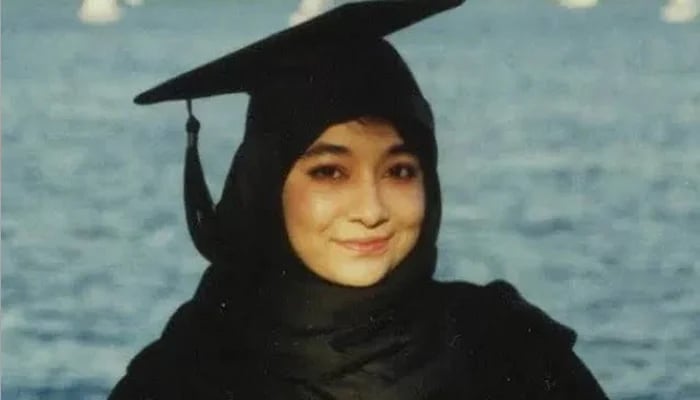Aafia Siddiqui's condition reflected years of pain, torture in jail: Ahmed
Dr Aafia "miserable and terrified of jail torture" and was in poor health, Senator Mushtaq Ahmed says
Pakistani neuroscientist Dr Aafia Siddiqui's condition reflected years of pain and torture meted out to her in the United States prison, said Jamaat-e-Islami (JI) Senator Mushtaq Ahmed while describing what he observed in a meeting with the prisoner.
Dr Aafia, who has been jailed in the US for over a decade, finally met her younger sister Dr Fauzia Siddiqui after 20 years, at the Federal Medical Center, Carswell in Texas on Wednesday.
Today, the JI senator, accompanied by Dr Fauzia and Clive Stafford-Smith — a prominent human rights activist who also helped liberate Abdul Rabbani and Ahmed Rabbani from the notorious Guantanamo Bay prison — also met the incarcerated doctor.
Sharing the details of a three-hour-long telephonic conversation, Senator Ahmed said that Dr Aafia looked "miserable and terrified" of the torture she has been suffering in imprisonment.
"Dressed in off-white scarf, khaki dress, white joggers, Dr Aafia [held] a three-hour long telephonic meeting/conversation — which was being continuously recorded — in a small room partitioned with a glass shield," he wrote on Twitter.
He said that Dr Aafia was in poor health and her eyes watering again and again.
"[Her] front four teeth were broken and is having difficulty in hearing due to a head injury. She was continuously saying 'take me out of this hell'," he wrote.
At the end of the meeting, Dr Aafia was taken in chains.
The senator said they tried to keep Dr Aafia's mind diverted by discussing books, literature, poetry and other topics.
"She showed extraordinary verbal skills in conversation about Ghalib, Iqbal and Hafeez Jalandhri and philosophical, scientific discourses when talked on the topics of books, literature, poetry, but suddenly she would remember her children, mother, and the pain [suffured] in imprisonment and the terrible future of the prison, and say, 'take me out of this hell' with sadness."
Senator Ahmed then called on the politicians to get Dr Aafia released, saying that "the key to Dr Aafia's release is present in Islamabad, not in Washington."
Who is Dr Aafia?
A US-educated Pakistani scientist, Dr Aafia Siddiqui was jailed 2010 for 86 years by a New York federal district court in September 2008 on charges of attempted murder and assault, stemming from an incident during an interview with the US authorities in Ghazni, Afghanistan — charges that she denied.
She was the first woman to be suspected of Al-Qaeda links by the US, but never convicted of it.
At 18 years old, Siddiqui travelled to the US, where her brother lived, to study at Boston's prestigious MIT, later earning a PhD in neuroscience at Brandeis University.
But after the 9/11 terror attacks of 2001, she came up on the FBI's radar for donations to Islamic organisations and was linked to the purchase of $10,000 worth of night-vision goggles and books on warfare.
The US suspected she joined Al-Qaeda from America, returning to Pakistan where she married into the family of Khalid Sheikh Mohammed — an architect of the 9/11 attacks.
She disappeared in around 2003, along with her three children, in Karachi.
Five years later she turned up in Pakistan's war-torn neighbour Afghanistan, where she was arrested by local forces in the restive southeastern province of Ghazni.
-
Security forces gun down 30 terrorists in multiple IBOs in KP: ISPR
-
MQM-P calls for new province in Sindh
-
US report validates Pakistan military edge over India: PM
-
Banned TTP poses serious threat to Pakistan security: UNSC panel
-
CM Afridi clarifies remarks on by-poll after ECP requests army deployment
-
Dubai sees 3.2m Pakistani passengers in 2025 as airport sets new milestone
-
Security forces kill 23 Indian proxy terrorists in KP's Kurram
-
Pakistan to construct island to boost oil exploration: report












